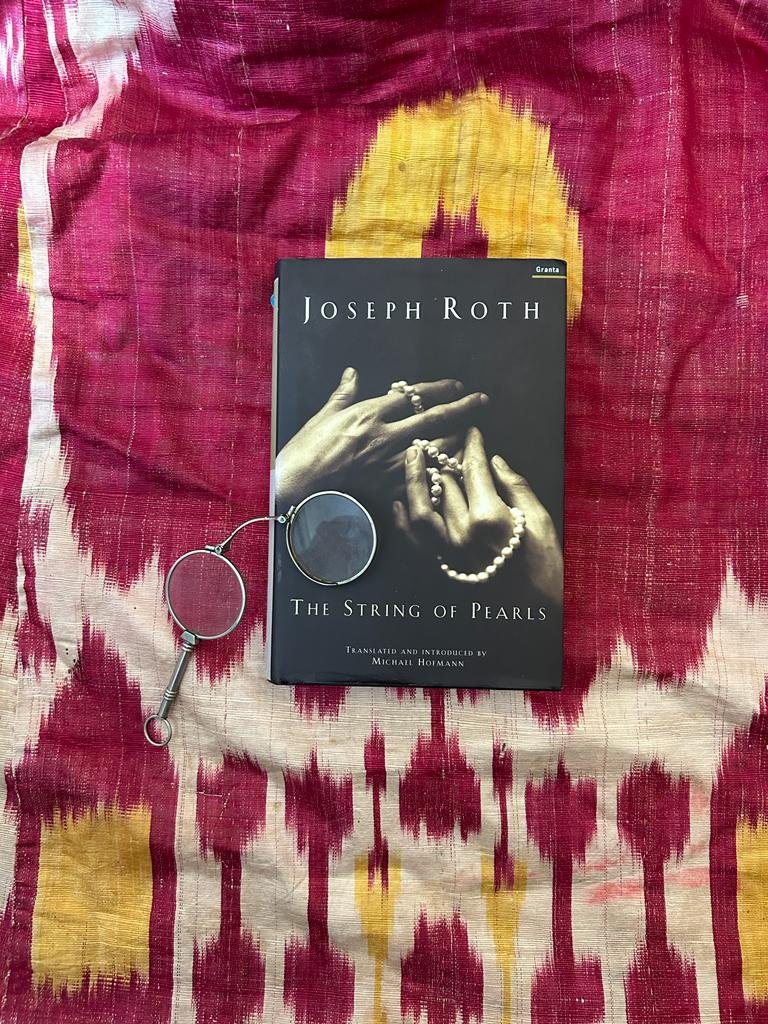The characters in Joseph Roth’s The String of Pearls live in the decadence of 19th century Vienna. But the novel begins in the Persian court. The Shah is dissatisfied. He can no longer stand all his desires being fulfilled. He longs for change. His chief eunuch tells him variety is merely an illusion, and to prove his point he suggests the Shah goes to Vienna. Thus the story begins.
One would think that the world of yesteryear would be impossible to convey; yet Roth, through his lucid and elegant prose, vivid characters, and Fledermaus like plot line, transports the reader back to the “Golden Age of Security”.
The characters represent the entirety of Viennese society. Like in a Guy de Maupassant degenerates and aristocrats mix. Arguably the greatest character is Baron Taittinger, Captain of the 9th Dragons. For him only three types of people exist: bores, so-so, and charming. With this worldview the Baron has an affair with a girl named Mizzi Schinagl who works in a pipe shop. He only begins the affair because Mizzi bares a resemblance to the Countess W., who rejected the Baron and married a “bore”. The Baron’s affair with the look-a-like results in a child. The Baron finds this “tedious”. He does nothing to help, not out of malice but simply because he finds it too boring. Mizzi ends up working in a brothel. And this is how the Shah comes to meet her.
The Shah, succumbed by ennui, went to Vienna to find excitement. At a ball, he sees a beauty. The Shah wants to sleep with her. But there is a problem; she is the Countess, the same Countess who was adored by the Baron and married a bore. She, of course, cannot be handed over to the Shah. But the Shah does not understand. This puts the Austrians in a difficult situation; they cannot possible ask the Countess to sleep with the Shah, but they do not want to refuse the Shah’s request since it would be perceived as a diplomatic snub. So the Baron suggests they use the look-a-like, Mizzi, who works in the brothel. The Baron thought the whole idea was amusing.
The Shah is fooled. He believes he has slept with the Countess when - in reality - he has slept with the prostitute Mizzi. The Shah gives a string of pearls to the fake Countess and leaves for Persia. Ordinarily the novel would finish here but instead Roth deals with the consequences. The next half of the novel tells us what happens afterwards.
As the characters slowly age and rot, the decline sets in. From being an amusing satire the story becomes a grotesque tragedy; we hear of the decline and fall of Frau Mazner, the brothel owner, who employed Mizzi. Her youth fades, and she becomes an avaricious, lonely, old woman looking back on her youth, her only emotion now is melancholy. The writer turns this detestable character into a pitied one. We hear of the Baron’s friend, the sergeant, who desperately tries to save the Baron from himself but, alas, fails and ends up as a Lieutenant paymaster working in some distant outpost near the Russian border.
It is a pleasure to read this book in English thanks to the translator Micheal Hoffman. The difficulty of literary translation itself cannot be understated; change too much and it will lose its original meaning, change nothing and it will not make sense. Yet, Hoffman balances the two; somehow he conveys the Viennese humour in such a way that the English reader can laugh along. I would strongly recommend this book and Micheal Hoffman’s translation.
Review by Peri Newman
This review was written for the ACF London's EXPLORE OUR LIBRARY initiative.

